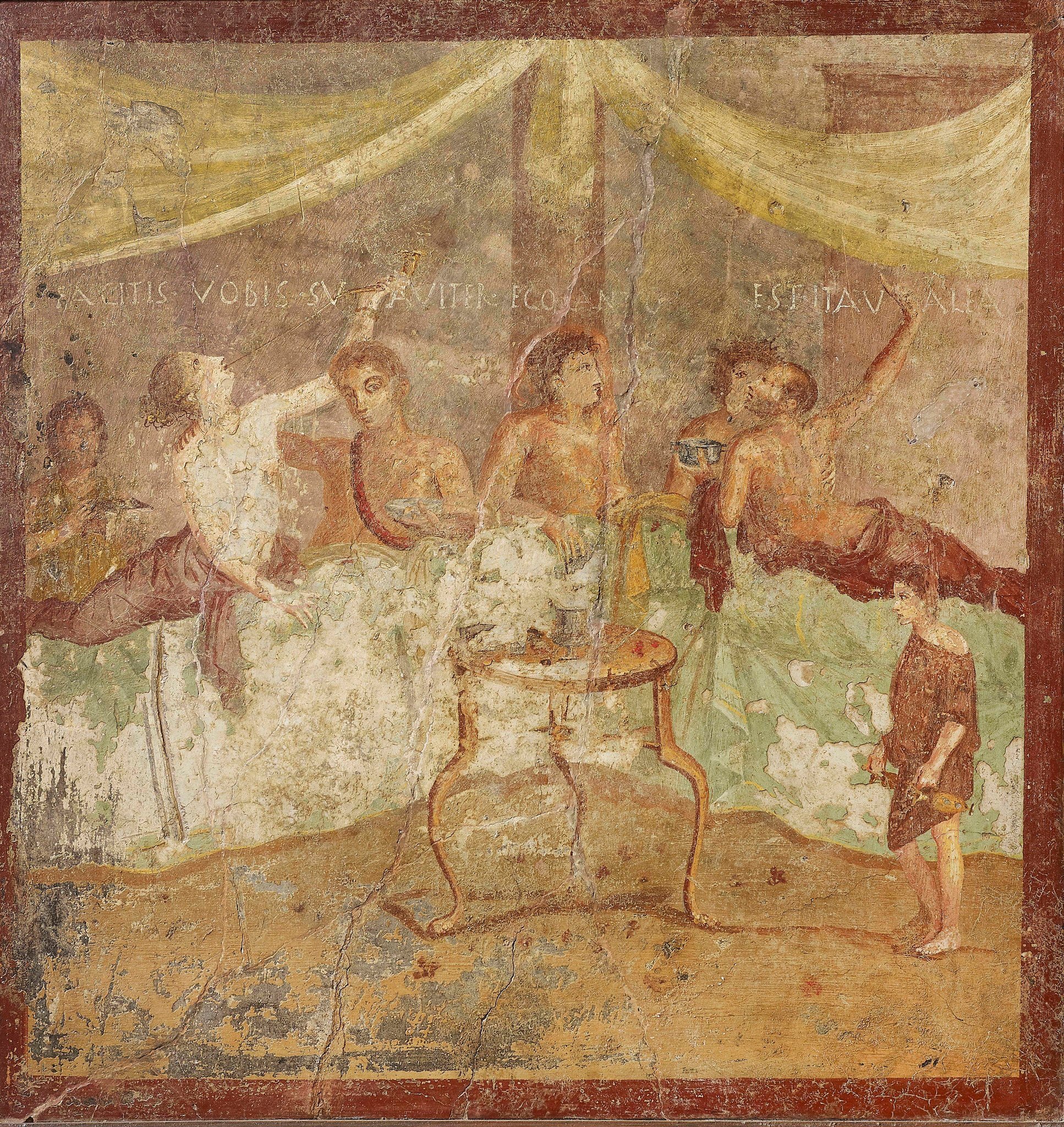Mardi Gras with Galen: a recipe for ancient Roman pancakes
Here’s a recipe (well, sort of) and description of how pancakes were cooked in ancient Rome. Some things to note: Galen points out the word for ‘pancake’ is pronounced differently by Attic and Asiatic Greek speakers, where the α and the η are switched: ταγηνῖται (tagenitai) vs. τηγανῖται (teganitai). The word for ‘pan’, τάγηνον (tagenon), doesn’t seem to undergo this vowel shift. It is cognate with tajine, but a tajine is more like the ancient kribanos, which Galen mentions in relation to the more common kind of cake, itrion (ἴτριον), known as libum in Latin (a nice recipe here; I like this how-to video). Galen associates these cakes with country people and very poor city people who he tells us make their bread out of whatever they have around. I also think it is interesting how long it takes Galen to describe something as familiar (at least to a North American) as flipping a pancake. Flipping a cake must not have been a very common thing to do (I suppose it still isn’t something one does to most cakes).
“Now would be a good time to talk about all those other cakes that they make from wheat flour. The ones called tagenitai [pancakes] by the Attic speakers but teganitai by us Greek speakers in Asia are prepared solely with olive oil. The oil is placed in a pan that is set on a smokeless fire and once it’s hot wheat flour that’s been mixed with lots of water is poured onto it. After it has cooked for a short time in the oil, it sets and thickens like soft cheese solidifying in baskets. At this point the cooks turn it round, bringing the upper side underneath so that it comes into contact with the pan and turning the side that used to be underneath and is sufficiently cooked so that it becomes the top; once the side underneath has set, they turn it round again two or three times until they think it has been cooked through.
“Now, it’s clear that this is thick-humoured, able to block the stomach, and productive of raw humours. That’s why some people mix honey with it and others sea salt as well. This would be a “kind” or “type” (or whatever your want to call it) of flat-cake, like many other such types of flat-cakes made from whatever’s at hand by country people and very poor people in the city. Likewise all those unleavened cakes they bake in a kribanos then remove and put immediately into warm honey so that it soaks them through, these too are a kind of flat-cake, as are all dishes prepared from cakes with honey.”
Περὶ δὲ τῶν ἄλλων πεμμάτων, ὅσα σκευάζουσιν ἐξ ἀλεύρου πυρίνου, καιρὸς ἂν εἴη λέγειν. οἱ μὲν οὖν ταγηνῖται παρὰ τοῖς Ἀττικοῖς ὀνομαζόμενοι, παρ' ἡμῖν δὲ τοῖς κατὰ τὴν Ἀσίαν Ἕλλησι τηγανῖται σκευάζονται δι' ἐλαίου μόνου. βάλλεται δὲ τὸ μὲν ἔλαιον εἰς τάγηνον ἐπικείμενον ἀκάπνῳ πυρί, καταχεῖται δ' αὐτῷ θερμανθέντι τὸ τῶν πυρῶν ἄλευρον ὕδατι δεδευμένον πολλῷ. διὰ ταχέων οὖν ἑψόμενον ἐν τῷ ἐλαίῳ συνίσταται καὶ παχύνεται παραπλησίως ἁπαλῷ τυρῷ τῷ κατὰ τοὺς ταλάρους πηγνυμένῳ. τηνικαῦτα δ' ἤδη καὶ στρέφουσιν οἱ σκευάζοντες αὐτό, τὴν μὲν ἄνωθεν ἐπιφάνειαν ἐργαζόμενοι κάτωθεν, ὡς ὁμιλεῖν τῷ ταγήνῳ, τὸ δ' αὐτάρκως ἡψημένον, ὃ κάτωθεν ἦν πρότερον, εἰς ὕψος ἀνάγοντες, ὡς ἐπιπολῆς εἶναι, κἀπειδὰν ἤδη καὶ τὸ κάτω παγῇ, στρέφουσιν αὖθις αὐτὸ δίς που καὶ τρίς, ἄχριπερ ἂν ὅλον ὁμαλῶς αὐτοῖς ἡψῆσθαι δόξῃ.
εὔδηλον οὖν, ὅτι παχύχυμόν τε τοῦτ' ἐστὶ καὶ σταλτικὸν γαστρὸς καὶ χυμῶν ὠμῶν γεννητικόν. διὸ καί τινες αὐτῷ μιγνύουσι μέλιτος, εἰσὶ δ' οἳ καὶ τῶν θαλαττίων ἁλῶν. εἴη δ' ἂν ἤδη τοῦτό γε πλακοῦντός τι γένος ἢ εἶδος ἢ ὅπως ἂν ὀνομάζειν ἐθέλῃς, ὥσπερ καὶ ἄλλα πολλὰ τοιαῦτα πλακούντων εἴδη συντιθέασιν αὐτοσχεδίως οἵ τε κατ' ἀγρὸν ἄνθρωποι καὶ τῶν κατὰ πόλιν οἱ πενέστατοι. τοιγαροῦν καὶ ὅσα διὰ κριβάνου τῶν ἀζύμων πεμμάτων ὀπτῶσιν, εἶτ' ἀφελόντες ἐμβάλλουσιν εὐθέως εἰς μέλι θερμόν, ὡς δέξασθαι δι' ὅλων ἑαυτῶν αὐτό, καὶ ταῦτα πλακοῦντός τι γένος ἐστὶ καὶ τὰ διὰ τῶν ἰτρίων σκευαζόμενα μετὰ μέλιτος πάντα.
Update 22 February 2021
My nieces (with my sister’s help) decided to try out Galen’s recipe along with some traditional pancakes. They used some very light olive oil and some locally milled whole wheat flour. Here’s a quick video.


